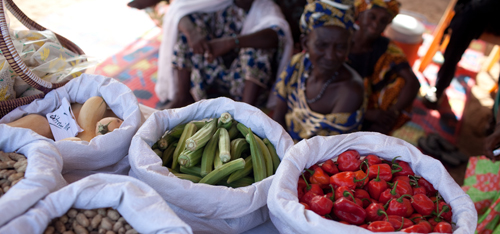Activities
Reducing pesticide risks
IPPM assists governments in creating an enabling policy environment to reduce pesticide use in agriculture and trains farmers on improved cropping practices that rely less on chemical fertilizers and toxic insecticides, while raising community awareness of the risks associated from the use of the most highly toxic pesticides in their location.
Adapting to climate change
Increasing climate challenges, including drought, floods and unpredictable seasonal rains, will make it difficult for farmers to grow food and raise livestock. The programme is working to build more resilient agricultural production systems by developing the capacity of local and national stakeholders to integrate climate-change adaptation strategies into agricultural development initiatives, policies and programming.
Marketing safe and nutritious food
Helping farmers successfully market what they grow is as equally important as helping them boost their production. The IPPM programme is working to develop the capacity of vegetable farmers and producer organizations to improve the safety and commercial appeal of their produce; to plan and organize production more effectively and to engage in market research, trade and group marketing.
Empowering communities
IPPM seeks to empower farmers and communities through activities that develop organizational skills and productive social interactions. At present, IPPM collaborates with Dimitra listeners' clubs in Senegal and similar clubs in Mali, Mauritania and Niger to improve open discussion, access to information and knowledge exchange in rural communities, especially among women and youth.
Training facilitators
The programme trains facilitators on IPPM activities, using master trainers and specialists. These facilitators − often local farmers who themselves have undergone previous farmer field school (FFS) training − then share their acquired skills and knowledge with farmers in their own communities via season-long FFS, helping to develop knowledgeable peers who will further the learning process over time.

